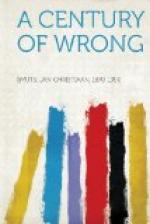“Race hatred is, however, not so intense in South Africa as to enable a body with this propaganda, aiming at revolutionary objects, to obtain much influence in this part of the world; and one continually asks oneself the question—’How is it that a body, so insignificant both in regard to its principles and its membership, enjoys such a large measure of influence?’ The answer is that this body depends upon the protection and the support of Her Majesty’s Government in England, and that both its members and its organs in the Press openly boast of the influence they exert over the policy of Her Majesty’s Government. This Government would ignore such assertions; but when it finds that the ideas and the shibboleths of the South African League are continually echoed in the speeches of members of Her Majesty’s Government, when it finds that blue books are compiled chiefly from documents prepared by officials of the South African League, as well as from reports and leading articles containing ‘malignant lies’ taken from the press organs of that organisation, thereby receiving an official character, then this Government can well understand why so many of Her Majesty’s right-minded subjects in this part of the world have obtained the impression that the policy advocated by the South African League is supported by Her Majesty’s Government, and is thus calculated to contribute to the welfare and blessing of the British Empire.”
“If this mistaken impression could be removed, and if it could be announced as a fact that the South African League, as far as its actions in the South African Republic are concerned, is only an organisation having as its object the fomentation of strife and disorder and the destruction of the independence of the Country, then it would very soon lose its influence, and the strained relations existing between the two Governments would quickly disappear. The Africander population of this country would not then be under the apprehension that the interests of the British Empire imperatively demand that the Republic should be done away with, and its people be either enslaved or exterminated. Both sections of the white inhabitants of South Africa would then return to the fraternal co-operation and fusion which was beginning to manifest itself when the treacherous conspiracy at the end of 1895 awakened the passions on both sides.”
As a result of the continual agitation of the South African League, three occurrences were selected and elevated by Mr. Chamberlain into culminating instances of the Uitlander grievances. To give the world a clear insight into the nature of the grievances in general, extracts are given from the official accounts both of the British and the Republican account of these occurrences. There were three—the “Lombard affair,” with reference to the maltreatment of coloured British subjects at Johannesburg; the “Edgar case,” in connection with the shooting of an English subject by a police official; and the “Amphitheatre occurrence,” in regard to a disorderly meeting of the South African League.




